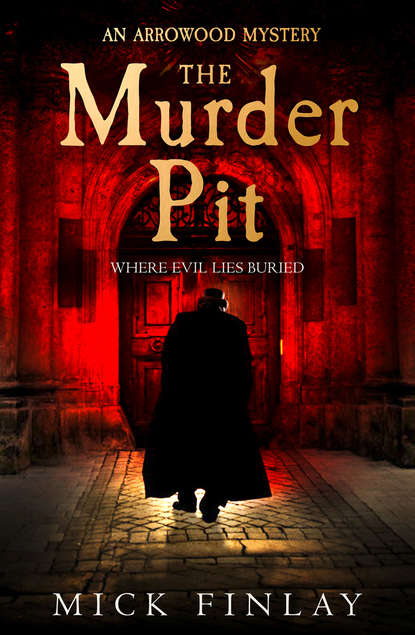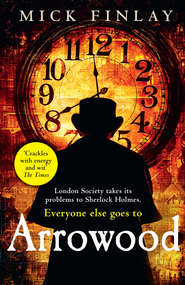По всем вопросам обращайтесь на: info@litportal.ru
(©) 2003-2024.
✖
The Murder Pit
Автор
Год написания книги
2019
Настройки чтения
Размер шрифта
Высота строк
Поля
Without waiting for an answer, he turned and marched up the road, hoping no doubt we’d follow without him having to speak again. I was glad of it: I needed something to move us on from the silence of the walk back to town.
It was a bare room, unswept, unpainted, cold enough to freeze the nose off a brass monkey. Mould speckled the ceiling; damp rose from the floorboards. Sergeant Root was sat at a desk reading a paper. He had a long, droopy face, his neck hidden by a double chin. His moustache was thick, his eyes melancholy.
‘The agents, Sarge,’ said the lad.
‘Right,’ whispered Root.
The guvnor offered his hand. ‘I’m Mr Arrowood, Sergeant. This is my assistant, Mr Barnett.’
The copper nodded, his eyes losing what little light they had in them. He looked the guvnor up and down, at his shoes starting to split at the knuckle, at the blue astrakhan coat rubbed bare around the buttons, at the nose blooming like cocksomb. He turned to the boy. ‘Here’s a lesson for you, lad. These fellows get paid to watch folk. Spying through windows. Hiding behind trees. Cause a lot of trouble for decent families, they do.’
‘Yes, sir.’
The guvnor started to protest but Root held up his hand.
‘I’ve had complaints about you, Arrowood, poking your nose into the Ockwells’ private affairs. I know what Mr Barclay’s been saying about them, but it ain’t true. They’re a good family. Been running that farm for generations. It’s no crime if a married woman doesn’t want to see her parents. Never has been, never will be. Now, I don’t want you upsetting folk here on my patch. D’you understand?’
‘But she’s in trouble, Sergeant,’ said the guvnor. ‘The Ockwells refuse to let us talk to her. Yesterday Walter chased us off with a shotgun. He assaulted Mr Barnett.’
‘Way I heard it you refused to leave his property.’
‘Birdie was in the upper window,’ said the guvnor. ‘She was trying to signal to us.’
‘Was she now. What did she say?’
‘She didn’t speak. No doubt she was afraid of being overheard. She held a picture of Brighton Pavilion to the glass.’
The sergeant raised his eyes at the young copper who dropped his head, hiding his smirk.
‘I’m certain they’re keeping her prisoner, Sergeant,’ said the guvnor. ‘She was asking for help.’
‘Asking for help, was she? Listen, Arrowood, in my experience a lady never shows a picture of Brighton Pavilion when she needs help. Not in my experience. You know she’s weak-minded, I suppose?’
‘She has a scar on her head where the hair’s been torn out.’ The guvnor’s voice was rising. I could see he was getting up steam, so I took his arm to remind him to keep civil. ‘You know Walter’s a violent man. You must at least make sure she’s safe. It’s your duty.’
‘Don’t tell me what I must do!’ barked the copper, suddenly losing his patience. ‘Get out! And if I hear you’ve been bothering anyone again I’ll haul you in for creating a nuisance.’
‘We’ve heard of three dead children on the farm,’ said the guvnor, wrenching out of my grip. ‘D’you know about that?’
‘Three dead children? What are you talking about?’
‘Mrs Gillie said there’d been three dead children at the farm over the last few years yet only one was buried.’
‘Mrs Gillie,’ said the sergeant, shaking his head that had no join with its neck. ‘You listen to me, Arrowood. She’s a mad old fox that woman. Sits in those woods doing all knows what, spells and whatnot. Middle of the night, all on her own. Ain’t nobody hasn’t suffered something on account of that old devil. She’s just making trouble as she always does. Take my word on it, if there’d been dead children I’d know about it.’
‘But you have to investigate!’ demanded the guvnor.
‘Make sure they leave, PC Young,’ said the sergeant, stepping into the back room and shutting the door.
Later that evening we paid a visit to the Barclays to tell them what had happened on the farm.
‘We think she was trying to communicate,’ said the guvnor. ‘Does the picture mean anything to you?’
The Barclays looked at each other.
‘We did take her to Brighton once,’ said Mr Barclay. ‘Yes, we did. She must have been saying she wants to come home to us.’
‘She used to keep magazines,’ said his wife. ‘She carries things she’s attached to. Feathers as well. She was always picking them up from the street.’
The guvnor put on his thinking face and stared at the unlit fire.
‘Feathers,’ he muttered. ‘So I was right. She was trying to attract our attention that time as well.’
‘What’ll you do now?’ asked Mr Barclay.
The guvnor sighed. ‘We hope to talk to some of the labourers tomorrow, see what they know. But since the family won’t allow us to see her and Birdie never leaves the house alone, we really do need the police to help. Root won’t budge, so we need someone higher. D’you know anyone of position who could exert some influence?’
‘I’m afraid we’re not well connected, Mr Arrowood.’
‘What about Kipling’s brother?’
‘He moved away before we arrived. We never met him.’
‘Your employer, then. He’s a wealthy man, I suppose. He must know someone.’
‘I could try,’ answered Mr Barclay with a shudder. ‘Though he’s not generally a helpful man.’
When I asked for another payment, Mr Barclay gave it with no objection. We promised to report back to them in two days time.
*
When we reached the camp next morning there was no sign of Mrs Gillie. The caravan door stood open, the old horse watching us from its tether. It was wrapped in piles of sack, yet still it shivered and snorted and moved from leg to leg. A bucket with the mugs we drank from the day before was on its side by the fire.
The guvnor called out for the old woman, his voice rising through the bare trees. He called again. He pulled his watch from his waistcoat.
‘Quarter to noon,’ he said. ‘Perhaps she’s relieving herself.’
‘D’you think she’s got second sight?’ I asked. ‘I mean, what she said about our wives?’
‘I don’t know. But she’s alone; she lost her husband. She might have just recognized the same in us somehow.’
I went over to feel the fire.
‘Stone cold. Hasn’t been lit yet today.’
He climbed the wooden stairs of the caravan and peered inside the doorway.
‘Mrs Gillie? Are you there?’
Другие электронные книги автора Mick Finlay
Arrowood




 0
0






